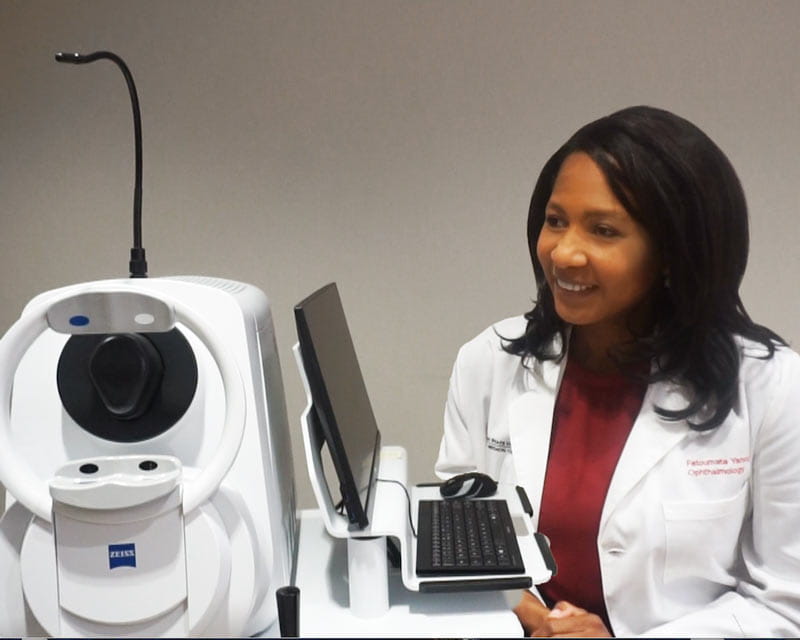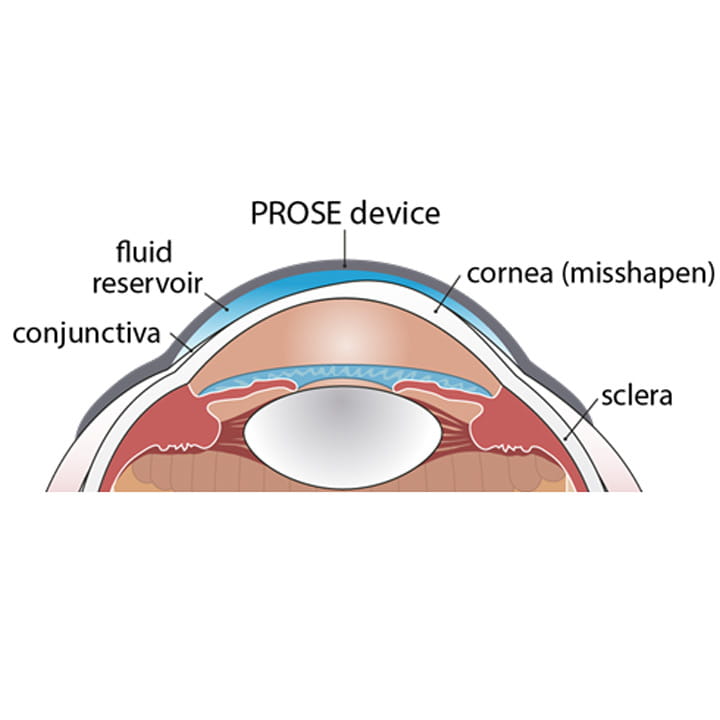
Swept-source OCT angiography reveals exquisite details of ocular structures
 A new prosthetic replacement of the ocular surface ecosystem (PROSE) clinic at The Ohio State University Wexner Medical Center provides customizable devices to improve the vision and quality of life for patients with ocular surface disease and advanced corneal conditions.
A new prosthetic replacement of the ocular surface ecosystem (PROSE) clinic at The Ohio State University Wexner Medical Center provides customizable devices to improve the vision and quality of life for patients with ocular surface disease and advanced corneal conditions.
Ohio State optometrists Chantelle Mundy, OD, and Stephanie Pisano, OD, completed specialty PROSE clinical fellowships and are two of only 30 providers worldwide certified to offer the treatments. Both optometrists oversee the PROSE clinic within the Advanced Specialty Contact Lens Clinic in the Department of Ophthalmology and Visual Sciences.
PROSE is a medical treatment by BostonSight that improves sight in individuals with disease of the ocular surface. PROSE is often the only treatment option to restore visual function and end suffering from critical and devastating eye issues resulting from complications of severe dry eye, keratoconus, ocular graft-versus-host disease, Sjögren’s syndrome, Stevens-Johnson syndrome, corneal damage or injury and other corneal diseases.
Ohio State is one of only 15 clinics in the United States to provide this care.
Patients who use PROSE lenses can get a driver’s license, return to work and live independently.
“It’s life-changing for patients,” Dr. Mundy says. “We put those devices on, and there is an instant change. They can see without pain and participate in life.”
Dr. Mundy and Dr. Pisano collaborate with cornea specialists and ophthalmologists to provide prosthetic devices to patients with complex cornea conditions. Scleral contact lenses and PROSE lenses sit on the eye, improve vision and provide comfort.
The PROSE device is made from gas-permeable plastic, and the outer edges rest on the white of the eye instead of on the cornea, increasing comfort and improving vision. They’re designed to create a barrier between the lens and the eye that consists of a liquid reservoir of preservative-free saline; this barrier also improves comfort.
The Advanced Specialty Contact Lens Clinic offers three scleral lens technologies for evaluation, diagnosis and fitting. Profilometry Eye Profiling, EyePrint Pro Technology and PROSE set Ohio State apart.
Access to these technologies and the clinic’s sole focus on ocular surface disease and advanced corneal conditions allow the care team to fit a higher percentage of patients for scleral lenses than the national average.
PROSE lenses are a step beyond scleral lenses. They’re highly personalized for each patient. A software program designs the PROSE lenses for an exact fit to the patient’s eye. They’re made from the same material as scleral lenses but are more comfortable, Dr. Pisano says.
Research shows that PROSE lenses are an effective, conservative and low-risk treatment.
PROSE lenses are worn daily while a patient is awake. They should be removed when sleeping to avoid infection.
The collaborative team environment and leadership support at Ohio State made the PROSE clinic possible, Drs. Mundy and Pisano say.
“We see these highly advanced conditions, and we work closely with our ophthalmology colleagues to manage them,” Dr. Pisano says. “Anytime we find a technology or application that gives patients options, we have been able to add it.”
Over the years, multiple technologies have been added to make Ohio State a leader in advanced eye care. For example, the EyePrint Pro Technology makes an impression-based mold of the eye using scanning technology. This helps create scleral lenses. Ohio State is one of three clinics in Ohio providing this service.
Because the treatments they provide are truly impactful, Drs. Mundy and Pisano want ophthalmologists and patients to know about the PROSE option.
Dr. Pisano says she asks every patient about their treatment goal. One patient living with severe eye pain spent most of his time inside in dark rooms.
His goal? “He wanted to make his Hello Fresh meal for dinner,” Dr. Pisano says. “That sounds simple to us, but he was able to do it. And he never thought a contact lens could change his life in that way.”